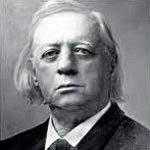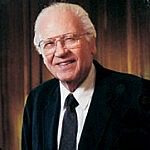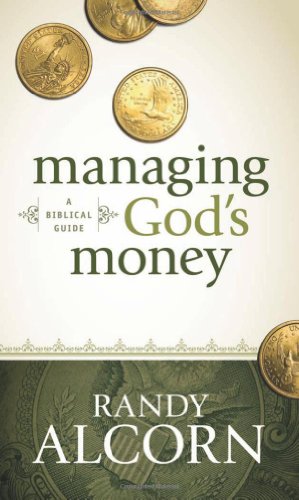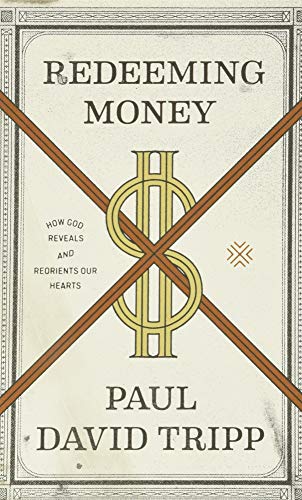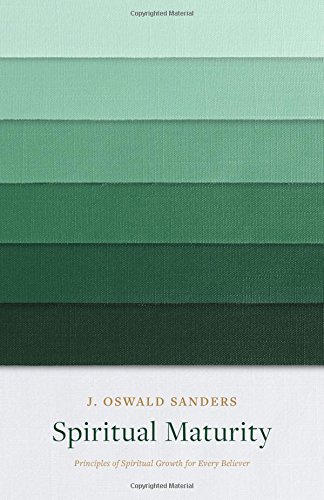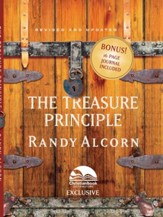Quotes about Money-Spirituality
God comes right out and tells us why He gives us more money than we need. It’s not so we can find more ways to spend it. It’s not so we can indulge ourselves and spoil our children. It’s not so we can insulate ourselves from needing God’s provision. It’s so we can give – generously. When God provides more money, we often think, This is a blessing. Well, yes, but it would be just as scriptural to think, This is a test.
The Treasure Principle, 2002, p. 73, Used by Permission from Eternal Perspective Ministries, www.epm.org. Get this book!
The parable of hidden treasure is one of many references Jesus made to money and possessions. In fact, 15% of everything Christ said relates to this topic – more than His teachings on heaven and hell combined. Why did Jesus put such an emphasis on money and possessions? Because there’s a fundamental connection between our spiritual lives and how we think about and handle money. We may try to divorce our faith and our finances, but God sees them as inseparable.
The Treasure Principle, 2002, p. 8, Used by Permission from Eternal Perspective Ministries, www.epm.org. Get this book!
Where your pleasure is, there is your treasure; Where your treasure is, there is your heart; Where your heart is, there is your happiness.
Seldom seest thou a man make haste to be rich, and thrive in religion. Christ’s message to John holds true; the poor are most forward in receiving and following the Gospel. As thou lovest thy zeal, beware of resolving to be rich, lest gain prove thy godliness; take heed of ambitious aspiring, lest courts and great places prove ill airs for zeal, whither it is as easy to go zealous as to return wise. Peter, while he warmed his hands, cooled his heart.
A Puritan Golden Treasury, compiled by I.D.E. Thomas, by permission of Banner of Truth, Carlisle, PA. 2000, p. 228.
It is the heart that makes a man rich. He is rich or poor according to what he is, not according to what he has.
In this world it is not what we take up, but what we give up, that makes us rich.
Where riches hold the dominion of the heart, God has lost His authority. Covetousness makes us the slaves of the devil.
You can always give without loving, but you can never love without giving.
Mainstream evangelicals are offended by "too much" talk about money, fearing that it may contaminate true spirituality. The real reason for seeking this silence, however, is subtle but clear: Too much emphasis on the spiritual necessity of giving as a matter of our salvation directly confronts our materialism and the individualistic privatization of our lives. The call to give is a call to flee the idolatrous worship of the Dollar and the Self by trusting in God’s grace alone for our happiness and security. To talk about money is to talk about God.
Unfortunately, many pastors are afraid to mention giving too often, lest the congregation think that the "church just wants our money." Such fears are misplaced theologically and often reflect our cowardice in the face of the reigning idols of our day. To speak about our need to give is to emphasize that we are God’s people through whom God glorifies Himself. The Corinthians’ participation in the collection was not "for the church," but evidence that they were the church.
Giving is not motivated by trying to convince people how "smart" and "responsible" and "enjoyable" it is to give…(rather we are to be) savoring and seeking the kingdom of God. Only the greater treasures of the kingdom of God can free us from clinging to the competing treasures of this world. Only the deeper satisfaction that comes from spending ourselves for others can defeat the sinfully natural impulse to use others for our own ends. And giving up ourselves for others can take place only when our own security needs have already been met in the Christ who spent Himself for us (2 Cor. 8:9). Hence, rather than focusing merely on more effective ways to advertise the benefits and obligations of giving, we need to pray for the pouring out of God’s Spirit on His people. Instead of bigger fund-raising campaigns, we need a bigger picture of God.
Jesus Christ said more about money than about any other single thing because, when it comes to a man’s real nature, money is of first importance. Money is an exact index to a man’s true character. All through Scripture there is an intimate correlation between the development of a man’s character and how he handles his money.
The truly godly person is not interested in becoming rich. He possesses inner resources which furnish riches far beyond that which earth can offer.
There is a burden of care in getting riches; fear of keeping them; temptation in using them; guilt of abusing them; sorrow in losing them; and a burden of account at last to be given concerning them.
God can have our money and not have our hearts, but He cannot have our hearts without having our money.
Disciplines of a Godly Man, Crossway Books, 1991, p. 186. Get this book!
The real measure of our wealth is how much we would be worth if we lost all our money.
I place no value on anything I have or may possess, except in relation to the kingdom of God. If anything will advance the interests of the kingdom, it shall be given away or kept, only as by giving or keeping it I shall most promote the glory of Him to whom I owe all my hopes in time or eternity.
There are three conversions: the conversion of the heart, mind and purse.
The sin is not in having more, the sin is being discontent. The sin is not in having wealth, the sin is in what you do with it. It’s not the amount, it’s the attitude… It’s not about what you have, it’s about how you feel about what you have.
The Rich Fool. The sermon originally appeared (https://www.gty.org/library/sermons-library/42-171/the-rich-fool) at www.gty.org. © 1969-2008. Grace to You. All rights reserved. Used by Permission.
Sixteen of the thirty-eight parables of Jesus deal with money. One out of ten verses in the New Testament deals with that subject. Scripture offers about five hundred verses on prayer, fewer than five hundred on faith, and over two thousand on money. The believer’s attitude toward money and possessions is determinative.
A Biblical Philosophy of Money:
1. God is the one who gives [someone] the ability to make money.
2. Everything we have belongs to God.
3. There are many things which are more valuable than gold.
4. Covetousness, discontentment, and worry about material things are sins.
5. God expects us to use fully the strengths and abilities He has given us in hard, honest work.
6. Giving to the Lord and to needy people is a privilege and an investment as well as a responsibility.
7. We ought to plan how we will make and spend our money.
8. We ought to live within our income and not make debts which may be almost impossible to pay.
There are many hearing me who now know well that they are not Christians because they do not love to give. To give largely and liberally, not grudging at all, requires a new heart.
A man’s treatment of money is the most decisive test of his character – how he makes it and how he spends it.
The world asks, “What does a man own?” Christ asks, “How does he use it?”
There are three kinds of giving: grudge giving, duty giving, and thanksgiving. Grudge giving says, “I have to”; duty giving says, “I ought to”; thanksgiving says, “I want to” (Robert Rodenmeyer).
Gold and godliness do not always go together (Jonathan Rourke).
While wealth cannot make people spiritual, it can reveal their spiritual priorities (Jonathan Rourke).
Worry over poverty is as fatal to spiritual fruitfulness as is gloating over wealth.
These orders [love for God and love for money] are diametrically opposed. The one commands you to walk by faith; the other to walk by sight. The one to be humble; the other to be proud. The one to set your affections on things above; the other to set them on the things that are on the earth. The one to look at the things unseen and eternal; the other to look at the things seen and temporal. The one to have your conversation in heaven; the other to cleave to the dust. The one to be careful for nothing; the other to be full of anxiety. The one to be content with such things as you have; the other to enlarge your desires. The one to be ready to distribute; the other to withhold. The one to look at the things of others; the other to look at one’s own things. The one to seek happiness in the Creator; the other to seek happiness in the creature. Is it not plain? There is no serving two such masters.
God increases our yield so that by giving we can prove our yield is not our god.
Desiring God, 1996, p. 169, Used by Permission, www.desiringGod.org. Get this book!
The reason the use of your money provides a good foundation for eternal life (1 Timothy 6:19) is not that generosity earns eternal life, but that it shows where your heart is. Generosity confirms that our hope is in God and not in ourselves or our money. We don’t earn eternal life. It is a gift of grace (2 Timothy 1:9). We receive it by resting in God’s promise. Then how we use our money confirms or denies the reality of that rest.
Desiring God, Bethlehem Baptist Church, 1996, p. 167, used by permission, www.desiringGod.org.
According to Jesus, our money does not just reflect our hearts; our hearts follow our money. One of the most effective ways to fuel affection for God is to give your resources in obedience to God.
Taken from Follow Me by David Platt. Copyright © 2013 by David Platt. Used by permission. Website: Radical.net. Page 148.
If anyone does not refrain from the love of money, he will be defiled by idolatry and so be judged as if he were one of the heathen.
God owns it all and [you] are stewards of His resources… Because you are stewards of the resources God has entrusted to you, every financial decision you make is actually a spiritual decision. For many, that’s a revolutionary concept. How you manage your finances is a pretty good barometer for the condition of your spiritual life.
Preparing for Marriage, 1997, p. 195, 198, Gospel Light/Regal Books, Ventura, CA 93003, Used by Permission. Get this book!
You will always spend your money on what is most important to you… If your giving to the church of Jesus Christ is poor, it is a clear sign that you’re not excited about the things that God takes delight in. And, if you truly do take delight in the growth and success of Christ’s church, put your money where your heart is.
Copied from: Pastor Driven Stewardship: 10 Steps to Lead Your Church to Biblical Giving by Rod Rogers, © 2006, p. 205. Used by permission of Rod Rogers – www.DynamicGiving.com. All rights reserved.
We know it isn’t ungodly to teach about money because the Bible is full of instructions on the subject. You’ve read the statistics:
1. The Bible has five hundred verses on prayer, fewer than five hundred verses on faith, but over two thousand verses dealing with money and possessions.
2. The book of Proverbs alone is filled with instructions about money.
3. It has been said that Jesus talked more about money than about any other subject. Of Jesus’ thirty-eight parables, sixteen deal with money management.
4. One out of every ten verses in the gospels has to do with money or possessions – a total of 288 verses.
5. There is more said in the New Testament about money, than about heaven and hell combined.
If God thought it was important to talk to His people about money management and giving, you and I have no right to neglect these parts of His word.
Copied from: Pastor Driven Stewardship: 10 Steps to Lead Your Church to Biblical Giving by Rod Rogers, © 2006, p. 5. Used by permission of Rod Rogers – www.DynamicGiving.com. All rights reserved.
How we use our money demonstrates the reality of our love for God. In some ways it proves our love more conclusively than depth or knowledge, length of prayers or prominence of service. These things can be feigned, but the use of our possessions shows us up for what we actually are.
If I look to money as my source of satisfaction, I am no longer looking to God. Money has replaced the living God as the primary affection of my heart. And the moment I depend more on my money is the moment my money has become my god. The First Commandment teaches us that the glorious God will not permit other gods before Him (Ex. 20:3). Money is clearly one of America’s greatest idols.
Summary of Principles for Christian Stewardship: 1. Giving is to be in proportion to wealth – 1 Cor. 16:2; 2 Cor. 8:3, 11, 12; 9:8-11 (precisely what percentage that might be is never stated by Paul). 2. Giving is to be regarded as a privilege; indeed, it is an act of worship and praise – 2 Cor. 8:4; Phil. 4:15-18. 3. Giving is to be voluntary, not forced – 2 Cor. 8:3,11-12; 9:5,7. 4. Giving is to be preceded by the dedication of oneself to the Lord’s work in whatever capacity possible – 2 Cor. 8:5. 5. Giving is to be characterized by a spirit of reciprocity – 2 Cor. 8:13-15. 6. The administration of Christian giving should take into consideration the principles [of integrity] that governed Paul’s approach to the collection [he assembled] – 2 Cor. 8:16-24. 7. Giving is to be characterized by forethought and prayer – 2 Cor. 9:7. 8. Giving must never be characterized by sorrow over money lost or by covetousness – 2 Cor. 9:5, 7. 9. Giving should always be cheerful and joyous – 2 Cor. 9:7. 10. Giving should not be undertaken with a view to personal enrichment; rather, one should give with the expectation that God will supply the giver with abundance for additional giving – 2 Cor. 9:8-11. 11. All giving is to be understood as finding its source, power, and pattern in the grace of God in Christ – 2 Cor. 8:1,9; 9:14-15.
A wise lover values not so much the gift of the lover as the love of the giver.
The richest person is not the one who has the most, but the one who needs the least.
The real measure of your wealth is how much you’d be worth if you lost all your money
Most men pray more for full purses than for pure hearts.
The reason use of money and the things it buys is one of the best indicators of spiritual maturity and Godliness is that we exchange such a great part of our lives for it. Because we invest most of our days working in exchange for money, there is a very real sense in which our money represents us. Therefore, how we use it expresses who we are, what our priorities are, and what’s in our hearts. As we use our money and resources Christianly, we prove our growth in Christlikeness.
Spiritual Disciplines for the Christian Life, 1991, p. 140, Used by permission of NavPress – www.navpress.com, All rights reserved. For more information please see the website www.BibicalSpirituality.org. Get this book!
The proportion of your income that you give back to God is one distinct indication of how much you trust Him to provide for your needs… We will give to the extent that we believe God will provide for us. The more we believe God will provide for our needs, the more we are willing to risk giving to Him. And the less we trust God, the less we will give to Him.
Spiritual Disciplines for the Christian Life, 1991, p. 143, Used by permission of NavPress – www.navpress.com. All rights reserved. For more information please see the website www.BibicalSpirituality.org. Get this book!
The use of your money and how you give it is one of the best ways of evaluating your relationship with Christ and your spiritual trustworthiness. If you love Christ with all your heart, your giving will reflect that If you love Christ and the work of His Kingdom more than anything else, your giving will show that. If you are truly submitted to the lordship of Christ, if you are willing to obey Him completely in every area of your life, your giving will reveal it. We will do many things before we will give someone else, even Christ, the rights over every dollar we have and ever will have. But if you have done that, it will be expressed in your giving. That’s why it’s said that your checkbook tells more about you than almost anything else.
Spiritual Disciplines for the Christian Life, 1991, p. 146, Used by permission of NavPress – www.navpress.com, All rights reserved. For more information please see the website www.BibicalSpirituality.org. Get this book!
Material wealth is either a window through which we see God or a mirror in which we see ourselves.



